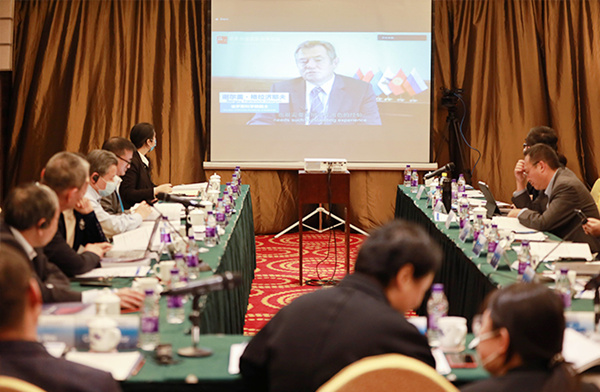
. > TOP STORIES
China’s development enriches economics and sociology
Author : JIANG HONG Source : Chinese Social Sciences Today 2021-10-29

The Panel of Economics and Sociology at The International Academic Forum in China 2021 in Beijing in mid-October Photo: Yang Chonghai/CSST
At The International Academic Forum in China 2021 in Beijing in mid-October, economists and sociologists exchanged ideas on China’s socioeconomic development in its process of modernization.
Based on their observation of China’s reality and features, experts offered their insights into the new and uniquely Chinese path to modernization and its contributions to existing mainstream theories.
China’s development features
By comparing the uniqueness of China’s opening up and the general theory of opening, Jiang Xiaojuan, dean of the School of Public Policy and Management at Tsinghua University, summarized the practical achievements and theoretical value of China’s opening up.
“China’s development path is different from other countries, especially opening up. Our path is unique and effective,” Jiang said. China is characterized by a gradual opening up, with underlying national conditions, systems, and cultural factors. Opening up has played an important role in promoting reform. The new stage of opening is characterized by institutional opening.
After reform and opening up, China has seen two major transformations: the economic system transformation, and social structural transformation, said Li Peilin, former vice president of the Chinese Academy of Social Sciences (CASS). The country transitioned from a highly centralized planned economy to a socialist market economy, meanwhile, it also transformed from an agricultural society, rural society, and traditional society to an industrial society, urban society, and modern society. The two transformations took place at the same time, which is very special in the history of modernization.
“Based on its own new development experience, China has formed a systematic theoretical understanding, laying the foundation for building a new development sociology based on the experience from the new and uniquely Chinese path to modernization,” Li said.
Cai Fang, former CASS vice president, analyzed the trickle-down effect, Thomas Piketty’s economic theories, and the Kuznets curve, and explored the redistribution method from the practice of different countries, especially Northern Europe. Cai believes that strengthening redistribution and expanding the middle-income group can help achieve common prosperity more effectively.
Huang Qunhui, director of the Institute of Economics at CASS, said that primary distribution focuses on the inclusiveness and coordination of economic growth, secondary distribution prioritizes realizing fairness through redistribution, and tertiary distribution highlights enterprises’ social responsibility. These can increase income and wealth stock, as well as enhance the level of public services.
“To achieve common prosperity, it first of all poses new challenges to a well-functioning government. We must accelerate the modernization of governance capabilities and governance systems, and provide better institutional guarantees for achieving common prosperity,” Huang said.
Research on China’s experience
Lyu Wei, president of Dongbei University of Finance and Economics, said that the new path to modernization of socialism with Chinese characteristics is characterized by the unity of socialism and the market economy, and the alignment between an efficient market and a well-functioning government. It is people-centered, with common prosperity as its fundamental pursuit. It aims to drive coordinated progress in material, political, cultural-ethical, social, and ecological terms.
Through empirical research into China’s issuing of consumer vouchers in response to the COVID-19 pandemic, Justin Yifu Lin, dean of the Institute of New Structural Economics at Peking University, showed that in China, governments at all levels truly have a motivation to serve the people.
“The new and uniquely Chinese path to modernization can provide useful experience and enlightenment for countries and nations that hope to accelerate development while maintaining their independence,” Lyu said.
“The economic development management system created by China can be used in other countries,” said Sergey Yurievich Glazyev, a full member of the Russian Academy of Sciences, in his video speech. Vietnam is implementing a similar economic model, and it has almost the same growth speed. Other ASEAN countries are also learning from China’s economic experience. Ethiopia enjoyed “explosive economic growth” after Chinese experts shared experience.
In the conditions of changes unseen in a century, without China’s participation, mankind will not be able to “ascend to a new level of global development characterized by balance, coordination, and inclusiveness,”noted Alexander V. Lomanov, deputy director of the Primakov Institute of World Economy and International Relations at the Russian Academy of Sciences.
Ye Shengtao made Chinese fairy tales from a wilderness
Ye Shengtao (1894–1988) created the first collection of fairy tales in the history of Chinese children’s literature...
-
How northern ethnicities integrated into Chinese nation
2023-09-18
-
Mogao caves
2023-09-12
-
Mogao Grottoes as ‘a place of pilgrimage’
2023-09-12
-
Time-honored architectural traditions in China
2023-08-29
-
Disentangling the civilizational evolution of China
2023-08-28
-
AI ethics in science fiction
2023-08-23













 2011-2013 by www.cssn.cn. All Rights Reserved
2011-2013 by www.cssn.cn. All Rights Reserved